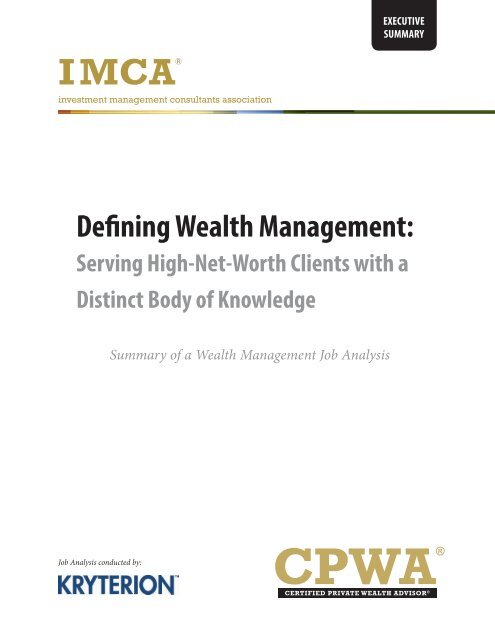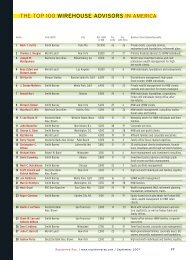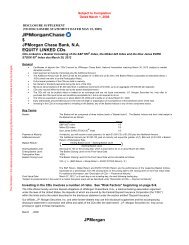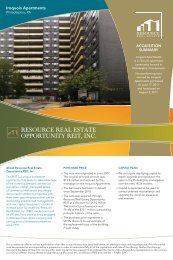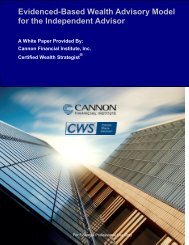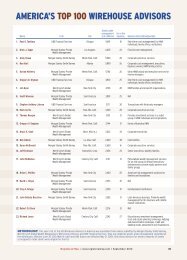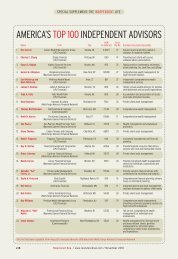Defining Wealth Management, Serving High-Net-Worth Clients
Defining Wealth Management, Serving High-Net-Worth Clients
Defining Wealth Management, Serving High-Net-Worth Clients
You also want an ePaper? Increase the reach of your titles
YUMPU automatically turns print PDFs into web optimized ePapers that Google loves.
Executive<br />
Summary<br />
investment management consultants association<br />
<strong>Defining</strong> <strong>Wealth</strong> <strong>Management</strong>:<br />
<strong>Serving</strong> <strong>High</strong>-<strong>Net</strong>-<strong>Worth</strong> <strong>Clients</strong> with a<br />
Distinct Body of Knowledge<br />
Summary of a <strong>Wealth</strong> <strong>Management</strong> Job Analysis<br />
Job Analysis conducted by:<br />
CPWA®<br />
Certified Private <strong>Wealth</strong> Advisor ®
investment<br />
management<br />
consultants<br />
association<br />
Table of Contents<br />
Overview . . . . . . . . . . . . . . . . . . . . . . . . . . . . . . . . . . . . . . . . . . . . . . . . . . . . . . . . . . . . . . 2<br />
Research Process and Methodology . . . . . . . . . . . . . . . . . . . . . . . . . . . . . . . . . . . . . . . . . . . . . . . 3<br />
<strong>Defining</strong> the Private <strong>Wealth</strong> Advisor: <strong>High</strong>-<strong>Net</strong>-<strong>Worth</strong> <strong>Clients</strong> . . . . . . . . . . . . . . . . . . . . . . . . . . . . . . . 4<br />
<strong>Defining</strong> the Private <strong>Wealth</strong> Advisor: Specialized Knowledge and Skills . . . . . . . . . . . . . . . . . . . . . . . . . . 6<br />
Comparison of Financial Planning and <strong>Wealth</strong> <strong>Management</strong> Topics . . . . . . . . . . . . . . . . . . . . . . . . . . . . 7<br />
Conclusion: A Distinctive Service Tailored to <strong>High</strong>-<strong>Net</strong>-<strong>Worth</strong> <strong>Clients</strong> . . . . . . . . . . . . . . . . . . . . . . . . . .11<br />
Endnotes . . . . . . . . . . . . . . . . . . . . . . . . . . . . . . . . . . . . . . . . . . . . . . . . . . . . . . . . . . . . . 11<br />
References. . . . . . . . . . . . . . . . . . . . . . . . . . . . . . . . . . . . . . . . . . . . . . . . . . . . . . . . . . . . .11<br />
Acknowledgments . . . . . . . . . . . . . . . . . . . . . . . . . . . . . . . . . . . . . . . . . . . . . . . . . . . . . . . . 12<br />
© 2012 Investment <strong>Management</strong> Consultants Association. All rights reserved.<br />
IMCA® and Investment <strong>Management</strong> Consultants Association® are registered trademarks of Investment <strong>Management</strong> Consultants Association Inc.<br />
CIMA®, Certified Investment <strong>Management</strong> Analyst®, CIMC®, CPWA®, and Certified Private <strong>Wealth</strong> Advisor® are registered certification marks of<br />
Investment <strong>Management</strong> Consultants Association Inc. Investment <strong>Management</strong> Consultants Association Inc. does not discriminate in educational<br />
opportunities or practices on the basis of race, color, religion, gender, national origin, age, disability, or any other characteristic protected by law.<br />
<strong>Defining</strong> <strong>Wealth</strong> <strong>Management</strong><br />
1<br />
www.IMCA.org
investment<br />
management<br />
consultants<br />
association<br />
Overview<br />
As a not-for-profit certification body, Investment<br />
<strong>Management</strong> Consultants Association® (IMCA®) has<br />
administered the Certified Private <strong>Wealth</strong> Advisor®<br />
(CPWA®) certification since 2007. Before that, the<br />
program had been operated by IMCA as a certificate<br />
program since 2004. The phrase “wealth management”<br />
has been in use since the early 1990s to describe a<br />
comprehensive service model akin to financial planning,<br />
and more recently it has been applied to comprehensive<br />
investment advisory services for high-net-worth clients.<br />
The term has even been taken up by estate planning<br />
attorneys, accountants, and some insurance specialists.<br />
As a result, there is no real consensus on the professional<br />
tasks, knowledge, and skills that should be associated<br />
with delivery of wealth management, whether at a<br />
fundamental level or an advanced or “mastery” level.<br />
Defined professions, such as those of lawyers, physicians,<br />
or nurses, all have migrated into specialized fields of<br />
practice. The definition of professional areas of practice<br />
occurs in many ways. The most common, and arguably<br />
the most effective, definition occurs when an intellectual<br />
discipline (such as finance) evolves through new<br />
technologies, processes, and applications. Professional<br />
organizations develop new best practices through<br />
conferences, communities, and other media, but the final<br />
stage in the emergence of a new field of practice usually<br />
is administered by a certification body that codifies a<br />
body of knowledge and qualifies practitioners through a<br />
certification process (see figure 1).<br />
<strong>Wealth</strong> management has evolved in this manner<br />
throughout the past 20 years. Starting in December<br />
2011, IMCA conducted a comprehensive job analysis<br />
to define the role of a private wealth advisor, and to<br />
provide content validity evidence to ensure that the<br />
CPWA certification program measures content that is<br />
currently relevant for competent performance in the<br />
job role. This paper summarizes the findings and key<br />
implications of the study.<br />
FIGURE 1: <strong>Defining</strong> a Professional Practice<br />
Schools usually have the role<br />
of preparing people to practice<br />
Foundation<br />
Certification bodies define<br />
the standards and the body<br />
of knowledge required for<br />
competent practice<br />
Codify<br />
<strong>Defining</strong> a<br />
Professional<br />
Practice<br />
Application<br />
Individual practitioners<br />
try new ideas, methods,<br />
principles, and applications<br />
of technology, products,<br />
and business<br />
Development<br />
Education and professional organizations<br />
expose practitioners to each others’ best<br />
practices and new areas of knowledge<br />
<strong>Defining</strong> <strong>Wealth</strong> <strong>Management</strong><br />
2<br />
www.IMCA.org
CPWA Job Analysis Study: Purpose,<br />
Process, and Profile of Respondents<br />
Purpose of the Job Analysis Study for<br />
Certification Programs<br />
All personnel certifications benefit from a clear<br />
understanding of the nature of the profession or practice<br />
that is being certified. Certification programs also<br />
must have a sound basis for associated educational<br />
curricula and examinations that lead to certification.<br />
When certification programs take the time and effort to<br />
conduct business in this manner, it ensures consumers,<br />
employers, and professional peers that they can expect<br />
a competent service at a given level from professionals<br />
who meet the certification requirements.<br />
IMCA® commissioned Kryterion Test Services, a<br />
professional certification test development and delivery<br />
company, to conduct a three-phase job analysis study,<br />
the results of which are being used by IMCA to<br />
refine experience, education, examination, and ethics<br />
requirements for the CPWA® certification program.<br />
Research Process and Methodology<br />
The procedures used in the CPWA job analysis study<br />
complied with all relevant technical and legal standards<br />
for professional certification and licensure as well as<br />
the requirements for accreditation by the National<br />
Commission for Certifying Agencies (NCCA) and the<br />
American National Standards Institute (ANSI). 1<br />
Phase #1. Subject matter experts in a variety of wealth<br />
management related fields met in Denver December<br />
8–10, 2011, to develop a list of tasks that may be<br />
performed as part of the private wealth advisor job and<br />
a set of knowledge and skills that may be required to<br />
perform those tasks.<br />
Phase #2. A survey instrument was compiled and<br />
distributed to more than 43,000 financial professionals<br />
from various sources to identify qualified professionals<br />
in various roles in the wealth management field. The<br />
survey was available from March 21 to May 7, 2012.<br />
Nearly 400 respondents completed the survey in its<br />
entirety, which met the minimum statistical sampling<br />
requirements for a population of this size.<br />
Phase #3. Finally, a separate group of volunteer subject<br />
matter experts gathered in Chicago July 21–22, 2012,<br />
to review and analyze data from the survey with the<br />
guidance of a psychometrician from Kryterion. From<br />
this analysis of survey results a systematic definition<br />
of tasks, knowledge, and skills was approved, outlining<br />
what is necessary to perform the duties of a private<br />
wealth advisor at an advanced competency level.<br />
In order to develop criteria for advanced professionals,<br />
data for more than 100 respondents were removed from<br />
the final data set including those professionals with less<br />
than five years of experience, professionals with more<br />
than half of their clients having less than $1 million of<br />
net worth, and respondents whose responses did not<br />
meet other acceptable response criteria.<br />
Profile of Private <strong>Wealth</strong> Advisors<br />
Approximately 250 responses were validated, with<br />
roughly 37 percent of the respondents coming from<br />
traditional investment brokerage firms; 30 percent<br />
coming from an independent channel; 25 percent<br />
coming from banks, trust companies, and wealth<br />
management firms; and the remaining 8 percent coming<br />
from other areas of industry (see figure 2).<br />
FIGURE 2: Profile of Job Analysis<br />
Respondents by Firm Type<br />
Independent<br />
channel<br />
30%<br />
Other<br />
8%<br />
Banks, trust<br />
companies,<br />
and wealth<br />
management<br />
firms<br />
25%<br />
Traditional<br />
investment<br />
brokerage<br />
firms<br />
37%<br />
Approximately 60 percent of the respondents have 20<br />
or more years of applicable experience serving highnet-worth<br />
clients and 36 percent have 10–19 years of<br />
experience. Forty-four percent of respondents reported<br />
holding a graduate-level or doctoral degree. Almost 90<br />
investment<br />
management<br />
consultants<br />
association<br />
<strong>Defining</strong> <strong>Wealth</strong> <strong>Management</strong><br />
3<br />
www.IMCA.org
investment<br />
management<br />
consultants<br />
association<br />
percent of respondents reported holding at least one<br />
professional designation, with approximately 33 percent<br />
reporting they hold the CFP® designation and 10 percent<br />
reporting they hold either the CFA® or CAIA designation.<br />
Most respondents reported offering a range of services to<br />
their clients including portfolio management, financial/<br />
wealth planning, retirement planning, tax planning,<br />
charitable and estate planning, multi-generational legacy<br />
planning, and/or specialized services for executives and<br />
closely held business owners.<br />
Approximately 80 percent of respondents regularly<br />
work with clients with a net worth of $5 million or<br />
more, 50 percent reported working with clients with a<br />
net worth of $25 million or more, and 30 percent of the<br />
respondents reported working with clients with a net<br />
worth of $100 million or more (see figure 3).<br />
The study defined wealth management as “a distinct<br />
field of practice through which qualified professionals<br />
help high-net-worth clients achieve their goals and<br />
objectives related to the accumulation, protection, and<br />
distribution of wealth by applying a set of specialized<br />
knowledge and skills.”<br />
According to the job analysis study, the two highlighted<br />
components of the description above are the primary<br />
defining characteristics of wealth management.<br />
<strong>Defining</strong> the Private <strong>Wealth</strong><br />
Advisor: <strong>High</strong>-<strong>Net</strong>-<strong>Worth</strong> <strong>Clients</strong><br />
Understanding the Consumer Landscape and<br />
the <strong>Wealth</strong> <strong>Management</strong> Universe<br />
There are more than 300 million households in the<br />
United States alone. Though each client household is<br />
unique, general categories of financial decisions, based on<br />
economic circumstances, can be identified. For example,<br />
consumers with minimal savings and low annual income<br />
are unlikely to benefit from advice on the limitations of<br />
income tax deductions for charitable donations. That<br />
advice, on the other hand, likely would be important and<br />
valuable for many high-net-worth clients.<br />
The CPWA job analysis study asked practitioners, “In<br />
your opinion, what is the minimum net worth that a<br />
client must have to be considered a high-net-worth<br />
client?” The survey allowed respondents to write in a<br />
number, rather than providing a forced response set. By<br />
far, the most-common response was $5 million in client<br />
net worth, with 43 percent of respondents writing in that<br />
number (see figure 4).<br />
Private wealth advisors have a finite potential client base<br />
to draw from in the United States. Spectrum Group’s<br />
Affluent Market Insights 2012 report found that there are<br />
an estimated 1.1 million households with a net worth of<br />
$5 million or more and 8.6 million households with a net<br />
worth of $1 million or more. 2<br />
FIGURE 3: Private <strong>Wealth</strong> Advisor Client Breakdown by <strong>Net</strong> <strong>Worth</strong><br />
$100 million or more<br />
client net worth<br />
$25 million or more<br />
client net worth<br />
$5 million or more<br />
client net worth<br />
0% 10% 20% 30% 40% 50% 60% 70% 80% 90%<br />
Percentage<br />
<strong>Defining</strong> <strong>Wealth</strong> <strong>Management</strong><br />
4<br />
www.IMCA.org
investment<br />
management<br />
consultants<br />
association<br />
FIGURE 4: Where Does “<strong>Wealth</strong> <strong>Management</strong>” Start?<br />
43%<br />
43 percent of respondents said that<br />
$5 million in client net worth was the<br />
starting point of “wealth management.”<br />
12% 12%<br />
10%<br />
14%<br />
5%<br />
3%<br />
2%<br />
$1M $2M $3–4M $5M $10M $15–20M $25–50M Over $50M<br />
FIGURE 5: Number of <strong>High</strong>-<strong>Net</strong>-<strong>Worth</strong> Households in the United States (in millions)<br />
10<br />
9<br />
8<br />
7<br />
6<br />
5<br />
4<br />
3<br />
2<br />
1<br />
0<br />
$1M+ <strong>Net</strong> <strong>Worth</strong><br />
$5M+ <strong>Net</strong> <strong>Worth</strong><br />
9.2<br />
7.8<br />
6.7<br />
8.4<br />
8.6<br />
1.16<br />
0.84<br />
0.98<br />
1.061<br />
1.078<br />
2007 2008 2009 2010 2011<br />
Source: Spectrem Group<br />
Another company, Capgemini, defined high-net-worth<br />
individuals as those with investable assets of USD $1<br />
million or more, excluding primary residence, collectibles,<br />
consumables, and consumer durables, and it reported 3.1<br />
million high-net-worth consumers in the United States in<br />
2010. 3 The Survey of Consumer Finances, published by the<br />
Federal Reserve, reported that the wealthiest 10 percent<br />
of U.S. households (about 11.4 million households) have a<br />
median net worth of approximately $1.9 million. 3 Figure 5<br />
reflects Spectrem Group’s estimate of the number of highnet-worth<br />
households in the United States.<br />
Whether you look at total net worth, investable assets,<br />
or the wealthiest 1 percent of the U. S. population, the<br />
conclusion is the same: A significant number of highnet-worth<br />
consumers are viable prospects for financial<br />
advisory services, but the supply of advisors who want to<br />
serve this distinctive group exceeds the demand.<br />
<strong>Defining</strong> <strong>Wealth</strong> <strong>Management</strong><br />
5<br />
www.IMCA.org
investment<br />
management<br />
consultants<br />
association<br />
According to Cerulli Associates, the total number<br />
of advisors from all advisory channels was 316,000<br />
in 2011. 5 Assuming just 50 clients per advisor, just 6<br />
percent of this advisor total (approximately 20,000<br />
advisors) could serve all the clients with a net worth of<br />
at least $5 million.<br />
<strong>Defining</strong> the Private <strong>Wealth</strong><br />
Advisor: Specialized Knowledge<br />
and Skills<br />
In any profession, understanding the scope of the<br />
position and its typical tasks is fundamental to successful<br />
practice. By obtaining the necessary skills to accomplish<br />
key tasks, individuals can equip themselves to better<br />
serve clients or customers as well as develop successful<br />
practices and contribute to their profession.<br />
The study identified 47 tasks that are organized into five<br />
task domains that define a process of providing wealth<br />
management advice to high-net-worth clients:<br />
1. Evaluating client needs: Understanding the client<br />
and client relationships, gathering key documents,<br />
and understanding the various wealth vehicles and<br />
holdings of the client.<br />
2. Analyzing, evaluating, and developing<br />
recommendations: Analysis of the client’s various<br />
financial statements, holdings, and strategies,<br />
including interactions with the client’s advisors and<br />
other professionals as needed.<br />
3. Advising, explaining, and implementing: Presenting<br />
and discussing recommendations including relevant<br />
issues and assessment of client knowledge.<br />
4. Monitoring and adjusting: Keeping abreast of different<br />
aspects of environmental or situational impacts on a<br />
client and making adjustments where prudent to better<br />
accomplish the client’s goals and objectives.<br />
5. Professional responsibility: Compliance with<br />
regulations including appropriate registrations,<br />
adherence to an ethical code that is applied<br />
to product decisions as well as client service,<br />
appropriate team management, and continued<br />
technical education.<br />
The body of knowledge and skills necessary<br />
to provide competent wealth management at<br />
an advanced level to high-net-worth clients<br />
incorporates 169 topics organized into four<br />
knowledge domains and eleven sections.<br />
CPWA Certification Knowledge<br />
Domains<br />
<strong>Wealth</strong> <strong>Management</strong> Body of Knowledge<br />
Domain I: Human Dynamics<br />
Section 1: Ethics<br />
Section 2: Applied Behavioral Finance<br />
Section 3: Family Dynamics<br />
Domain II: <strong>Wealth</strong> <strong>Management</strong> Strategies<br />
Section 4: Tax Strategies and Planning<br />
Section 5: Portfolio <strong>Management</strong><br />
Section 6: Risk <strong>Management</strong> and Asset<br />
Protection<br />
Domain III: Client Specialization<br />
Section 7: Client Focus–Executives<br />
Section 8: Client Focus–Closely Held Business<br />
Owners<br />
Section 9: Client Focus–Retirement<br />
Domain IV: Legacy Planning<br />
Section 10: Charitable Giving<br />
Section 11: Estate Planning and <strong>Wealth</strong><br />
Transfer<br />
As with financial planning, however, the breadth of<br />
knowledge necessary for private wealth advisors is<br />
substantially more comprehensive than investment<br />
advice, accounting, or estate planning. Regardless,<br />
the study found substantial differences between the<br />
knowledge and skills necessary for private wealth<br />
advisors compared to financial planning. For example,<br />
when comparing experienced private wealth advisors 6<br />
in the study to financial planners 7 in the study,<br />
some insights surface and convey the importance of<br />
specialized education and skills for individuals who work<br />
with high-net-worth clients.<br />
<strong>Defining</strong> <strong>Wealth</strong> <strong>Management</strong><br />
6<br />
www.IMCA.org
investment<br />
management<br />
consultants<br />
association<br />
TABLE 1: Comparison of <strong>Wealth</strong> <strong>Management</strong> and Financial Planning Topics<br />
Many topics covered in financial planning<br />
programs are too foundational for CPWA<br />
certification<br />
Examples of Foundational Topics<br />
• Personal financial statements<br />
• Time value of money<br />
• Fundamental economic, money, and banking<br />
concepts<br />
• Principles of communication and counseling<br />
• Principles of risk and insurance<br />
• Fundamental asset allocation and portfolio<br />
diversification<br />
• Social Security benefits<br />
Many topics covered by financial planning<br />
programs will be covered at a more advanced level<br />
within the CPWA certification program<br />
Examples of Generic topics<br />
• Family dynamics<br />
• Succession planning<br />
• Applied behavioral finance<br />
• Alternative minimum tax (AMT)<br />
• Multi-year tax modeling<br />
• Portfolio risk management<br />
• Alternative investments<br />
• Taxation of the sale of a business<br />
• Estate planning strategies<br />
Examples of core topics within CPWA certification that are NOT covered in most financial planning programs<br />
Examples of Advanced <strong>Wealth</strong> <strong>Management</strong> Topics<br />
• Complex partnership structures and taxation<br />
• Taxation from the sale of business transactions<br />
• Tax-aware investing for high-net-worth clients<br />
• Asset-protection strategies and structures<br />
(offshore)<br />
• Multi-trust structures and taxation<br />
• Advanced stock option planning and strategies<br />
• Endowments and foundations<br />
• Legacy and succession planning for multigenerations<br />
IMCA education staff compared the topic lists from the<br />
CFP Board of Standards and the exam blueprint from<br />
the CPWA job analysis study and described overlap in<br />
table 1. Based on this analysis, only 20 percent overlap<br />
exists between the knowledge and skills required for<br />
most financial planning education programs and the<br />
CPWA certification program.<br />
What does this mean? In order to effectively serve<br />
clients, advisors who meet advanced competency<br />
standards in wealth management must demonstrate<br />
specialized knowledge and skills in a number of areas,<br />
outlined in detail in the sections below.<br />
Four Knowledge Domains<br />
Domain I: Human Dynamics<br />
Most experienced financial advisors understand that<br />
personal characteristics of the client, whether conscious<br />
or unconscious, play a key role in shaping the role of the<br />
advisor. This study identified key knowledge and skill areas<br />
in human dynamics that differ from financial planning or<br />
other financial advisor roles as follows (see table 2):<br />
TABLE 2: Domain I—Human Dynamics<br />
Knowledge and Skill Areas of Importance for<br />
Private <strong>Wealth</strong> Advisors<br />
• Direct multi-generational wealth transfer<br />
• Identify various family dynamics<br />
• Develop family capital: human, financial,<br />
intellectual, and social<br />
• Understand family office services and structures<br />
• Effectively manage cognitive and emotional biases<br />
• Establish appropriate family governance and<br />
structures<br />
Section 1: Ethics<br />
Ethical responsibilities are a key component of many<br />
professions, and the highest-rated knowledge or skills<br />
within this section were those related to understanding<br />
how private wealth advisors act solely in the best interest of<br />
the client, perform duties according to a professional code<br />
of conduct, and pursue continuing education to maintain<br />
competency. Additional key responsibilities include<br />
disclosing compensation and conflicts of interest combined<br />
with ensuring compliance with the statutory and regulatory<br />
requirements imposed on financial advice providers.<br />
<strong>Defining</strong> <strong>Wealth</strong> <strong>Management</strong><br />
7<br />
www.IMCA.org
investment<br />
management<br />
consultants<br />
association<br />
Section 2: Applied Behavioral Finance<br />
Experienced financial advisors understand that money<br />
plays tremendous tricks on human emotions. The<br />
relationship between individuals and money becomes even<br />
more complex and emotional when clients have an average<br />
net worth of $10 million or more. Numerous aspects of<br />
behavioral finance take on increased significance, and<br />
knowledge and skills in that area become more essential.<br />
The study showed that, in general, understanding the<br />
adaptive market hypothesis and emotional and cognitive<br />
biases are important for the private wealth advisor.<br />
The final stage in the emergence of a new<br />
field of practice usually is administered by<br />
a certification body that codifies a body<br />
of knowledge and qualifies practitioners<br />
through a certification process.<br />
wealth transfer plans, incorporate needed infrastructure,<br />
and create a family education plan to meet the family’s<br />
objectives while accounting for individual learning styles<br />
and financial literacy needs.<br />
Domain II: <strong>Wealth</strong> <strong>Management</strong> Strategies<br />
As the name of this domain suggests, it contains the<br />
technical knowledge and skill areas that private wealth<br />
advisors should possess to effectively serve high-networth<br />
clients (see table 3). The complexity and scope of<br />
tax, investment, and insurance products and strategies<br />
available provide this area with many specialized<br />
skill and knowledge areas. Even experienced advisors<br />
may find themselves out of their depth when asked to<br />
collaborate with tax or estate planning experts. <strong>Wealth</strong>y<br />
clients use multi-disciplinary teams, and private wealth<br />
advisors from the study placed great importance on<br />
technical competence in navigating these sophisticated<br />
issues on behalf of clients.<br />
Survey respondents also indicated that in addition to<br />
understanding the evolution of behavioral finance and<br />
its relevance, private wealth advisors need to know how<br />
personality types and behavioral biases may impact<br />
client decision-making. Skills in analyzing the potential<br />
impact of behavioral finance on a client’s decision and<br />
applying a client-appropriate process were rated highly.<br />
Section 3: Family Dynamics<br />
Financial education for the next generation, legacy<br />
planning challenges including family business interests,<br />
establishing a family mission statement, and creating<br />
a plan to ensure wealth will survive for multiple<br />
generations all were rated as important skills for<br />
advanced private wealth advisors.<br />
Advanced practitioners serving wealthy families also<br />
gave high marks to the skills needed to identify family<br />
conflicts and dynamics, understand the values, goals, and<br />
objectives of individual family members, and develop<br />
plans that align individuals with appropriate roles<br />
including understanding how those roles play out with<br />
family organizations, trusts, and structures. In addition,<br />
the survey results show that private wealth advisors<br />
should possess the skills necessary to develop legacy/<br />
TABLE 3: Domain II—<strong>Wealth</strong> <strong>Management</strong><br />
Strategies<br />
Knowledge and Skill Areas of Importance for<br />
Private <strong>Wealth</strong> Advisors<br />
• Develop intra-family income-shifting and taxplanning<br />
strategies<br />
• Understand tax implications for trust entities<br />
• Work with multiple pass-through entities<br />
• Minimize the impact of the alternative minimum tax<br />
• Engage in multi-year tax modeling<br />
• Implement tax-aware investment strategies<br />
• Manage alternative investments<br />
• Effectively manage portfolio risk<br />
• Recommend directors and officers/errors and<br />
omissions insurance<br />
• Understand offshore strategies<br />
• Discuss multiple domestic trust structures and<br />
strategies<br />
• Avoid fraudulent conveyance<br />
• Understand family limited partnerships<br />
• Recommend property and casualty insurance for<br />
high-dollar and unique assets<br />
<strong>Defining</strong> <strong>Wealth</strong> <strong>Management</strong><br />
8<br />
www.IMCA.org
investment<br />
management<br />
consultants<br />
association<br />
Section 4: Tax Strategies and Planning<br />
Because tax planning becomes more complex as<br />
client income, type and number of applicable taxes,<br />
and variety of expenditures increase, private wealth<br />
advisors must maintain a strong level of competency<br />
across a broad set of skills and knowledge areas.<br />
Compared to financial planners or investment<br />
advisors working with mass-affluent clients, private<br />
wealth advisors need to possess additional skills<br />
and specialized knowledge in the following areas:<br />
incentive stock options taxation, charitable-giving<br />
strategies and rules, intra-family income-shifting<br />
and tax-planning strategies, tax implications for trust<br />
entities, pass-through entity tax liabilities, deductions<br />
on passive business activities, like-kind exchange<br />
taxation, and nonqualified stock options.<br />
The alternative minimum tax (AMT) also plays a significant<br />
role, because private wealth advisors need to understand<br />
how it is determined and its corresponding implications.<br />
Section 5: Portfolio <strong>Management</strong><br />
The study found that the CPWA program needs to<br />
place additional emphasis on tax-aware investment<br />
strategies, alternative investments, managing portfolio risk<br />
(including hedging), and leveraging. These areas prove<br />
statistically more important for advisors who want to<br />
work with high-net-worth clients and warrant additional<br />
education to ensure client needs and expectations are met.<br />
Section 6: Risk <strong>Management</strong> and Asset Protection<br />
The protection and preservation of assets is a priority<br />
for high-net-worth clients. Compared to financial<br />
planners and other advisors, it is more important for<br />
private wealth advisors to understand and be able to<br />
utilize strategies for unique risks including directors<br />
and officers/errors and omissions insurance, offshore<br />
asset-protection strategies and structures, numerous<br />
domestic trust types, the concept and acts of fraudulent<br />
conveyance, and property and casualty insurance for<br />
high-dollar assets.<br />
Private wealth advisors also value the need to understand<br />
the scope of available products and strategies for a<br />
variety of insurance options, asset-protection strategies,<br />
and creditor-protection strategies. In addition, they need<br />
the skill to compare policies, understand the implications<br />
of different strategies, and clearly communicate relevant<br />
information to clients.<br />
Domain III: Client Specialization<br />
Many high-net-worth individuals are executives and<br />
face unique situations and challenges including the<br />
receipt, taxation, and choice of various compensations<br />
and benefits. Closely held businesses also face complex<br />
scenarios and challenges, along with additional<br />
complexity in retirement income distributions. As a<br />
result, private wealth advisors need to be equipped with<br />
the knowledge and skills necessary to deal with the<br />
demands of these unique situations (see table 4).<br />
TABLE 4: Domain III—Client Specialization<br />
Knowledge and Skill Areas of Importance for<br />
Private <strong>Wealth</strong> Advisors<br />
• Analyze complex executive compensation plans<br />
• Develop plans for executive stock options and<br />
concentrated stock positions<br />
• Calculate the taxation of executive compensation<br />
• Determine closely held business owner entity<br />
selection<br />
• Discuss family issues and legacy planning for<br />
closely held business owners<br />
• Calculate the taxation of gains from income and<br />
sale of a closely held business<br />
• Determine the valuation of closely held<br />
businesses<br />
• Discuss sale structures and techniques for the sale<br />
of closely held businesses<br />
• Calculate the taxation of income distributions<br />
• Develop income distribution strategies and<br />
techniques<br />
• Discuss stretch individual retirement account<br />
planning<br />
• Understand net unrealized appreciation and other<br />
tax-minimizing techniques<br />
• Calculate required minimum distributions<br />
Section 7: Client Focus—Executives<br />
The study identified a large number of topics within the<br />
“Client Focus—Executives” section. This section also<br />
represents a significant area of difference for private<br />
wealth advisors compared to financial planners or other<br />
advisors. One key difference lies in the private wealth<br />
advisor’s ability to manage risk across all aspects of an<br />
executive’s compensation and benefit package.<br />
<strong>Defining</strong> <strong>Wealth</strong> <strong>Management</strong><br />
9<br />
www.IMCA.org
investment<br />
management<br />
consultants<br />
association<br />
Section 8: Client Focus—Closely Held Business Owners<br />
A significant portion of planning for closely held business<br />
owners revolves around the sale and succession strategy of<br />
the business. This includes understanding everything from<br />
the funding strategies to valuation methods and buy-sell<br />
agreements. Private wealth advisors should be equipped<br />
to guide a client through the buy-sell agreement, decisions<br />
on sales structure, and understanding the tax implications<br />
of a sale for various business entity structures. Arching<br />
over every aspect of planning for closely held business<br />
owners is the skill and knowledge necessary for private<br />
wealth advisors to help clients navigate family conflicts<br />
and initiate family conversations around succession<br />
planning for the business.<br />
Advisors participating in the study also prioritized<br />
knowledge topics such as understanding structure,<br />
formation requirements, governance, and taxation for<br />
the different types of business entity structures. Private<br />
wealth advisors should possess the knowledge necessary<br />
to understand the business lifecycle and the financing<br />
issues a business faces at different stages.<br />
Section 9: Client Focus—Retirement<br />
<strong>High</strong>-net-worth clients have more-complicated<br />
distribution-planning needs than other types of clients.<br />
Understanding the taxation of distributions, as well<br />
as various distribution strategies and techniques is<br />
important for private wealth advisors. In addition,<br />
knowledge of stretch individual retirement account<br />
(IRA) planning, recognizing unique opportunities such<br />
as net unrealized appreciation, and observing required<br />
minimum distributions are components that play a<br />
larger role when dealing with high-net-worth clients.<br />
Domain IV: Legacy Planning<br />
<strong>Clients</strong> of private wealth advisors have amassed<br />
significant wealth. Consequently, they place<br />
significant priority on the impact of their wealth and<br />
the legacy they will leave upon death. Charitable<br />
planning and estate planning have complicated<br />
rules, tax implications, and strategies that require a<br />
comprehensive set of knowledge and skills (see table 5).<br />
TABLE 5: Domain IV—Legacy Planning<br />
Knowledge and Skill Areas of Importance for<br />
Private <strong>Wealth</strong> Advisors<br />
• Determine the most-effective strategy for giving<br />
gifts to charities<br />
• Tax impact of gifts made to public and private<br />
charities<br />
• Develop charitable-planning strategies using<br />
charitable lead and charitable remainder trusts<br />
• Review estate and gift tax returns<br />
• Evaluate valuation discounts<br />
• Recommend intra-family transactions<br />
• Discuss the impact of partnerships, business<br />
interests, and illiquid assets in the estate<br />
• Understand various grantor and nongrantor trusts<br />
• Develop a comprehensive multi-generational<br />
estate plan<br />
Section 10: Charitable Giving<br />
Practically every aspect of charitable planning takes on<br />
additional importance for private wealth advisors. This<br />
is primarily due to the increased amount of charitable<br />
giving via cash and unique asset donations. The tax<br />
impact of gifts made to public and private charities, tax<br />
ramifications for cash and assets that have appreciated,<br />
and charitable-planning strategies using charitable lead<br />
and charitable remainder trusts are all rated as important<br />
by private wealth advisors.<br />
An advisor needs to guide the discovery process<br />
on a client’s charitable and legacy goals, be able to<br />
determine which vehicle(s) are most appropriate,<br />
and plan contributions in a fashion that maximizes<br />
deductions within the client’s goals. The advisor also<br />
needs to understand the rules and tax implications<br />
for contributions to and distributions from charitable<br />
remainder trusts, charitable lead trusts, and net income<br />
with makeup charitable remainder trusts (NIMCRUTs).<br />
Knowledge of private versus public charities as well as<br />
knowledge of private foundations, donor-advised funds,<br />
property donations, and unrelated business taxable<br />
Based on this analysis, only 20 percent overlap exists between<br />
the knowledge and skills required for most financial planning<br />
education programs and the CPWA certification program.<br />
<strong>Defining</strong> <strong>Wealth</strong> <strong>Management</strong><br />
10<br />
www.IMCA.org
investment<br />
management<br />
consultants<br />
association<br />
income (UBTI) within the operation or investments of a<br />
private foundation is essential.<br />
Section 11: Estate Planning and <strong>Wealth</strong> Transfer<br />
<strong>Wealth</strong> management clients have significantly larger<br />
taxable estates so it’s important that private wealth<br />
advisors possess skills and knowledge regarding estate<br />
planning and wealth transfer. In fact, knowledge of estate<br />
and gift tax returns, understanding valuation discounts,<br />
intra-family transactions, and understanding the impact<br />
of partnerships, business interests, and illiquid assets in<br />
the estate are all important competencies.<br />
The foundation of estate planning lies in discovering<br />
the client’s planning goals and objectives, having the<br />
knowledge necessary to understand estate-planning<br />
documents and strategies, an ability to incorporate<br />
appropriate products including insurance into the plan,<br />
the skill to review estate and gift tax returns, and the tax<br />
and legal implications other areas have on estate planning.<br />
Conclusion<br />
A Distinctive Service Tailored to<br />
<strong>High</strong>-<strong>Net</strong>-<strong>Worth</strong> <strong>Clients</strong><br />
The 2012 <strong>Wealth</strong> <strong>Management</strong> Job Analysis was<br />
facilitated by IMCA but designed, developed, and<br />
analyzed by experienced financial advisory practitioners<br />
from a variety of professions and all types of business<br />
models. The data overwhelmingly identified wealth<br />
management as a distinct practice that serves a unique<br />
client type with a specialized set of knowledge and skills.<br />
Advanced competency in wealth management is a<br />
practice, not a profession. Private wealth advisors work as<br />
tax professionals, estate planning professionals, financial<br />
planning professionals, or investment professionals.<br />
Not surprisingly, wealth advisors and financial planners<br />
use similar processes in working with clients. The<br />
fundamental tasks of establishing the relationship,<br />
gathering relevant information, and then using<br />
the information to develop, execute, and monitor<br />
appropriate strategies is a process that can be repeated<br />
for many professions including law, medicine, and many<br />
positions that provide financial advice.<br />
The process for working with clients may be similar<br />
for investment advisors, financial planners, and private<br />
wealth advisors, but the study identified an advanced and<br />
unique set of knowledge and skills needed to effectively<br />
serve high-net-worth clients.<br />
Endnotes<br />
1<br />
Kryterion Testing Services (2012).<br />
2<br />
See Spectrem Group (2012) and Reyneri (2012).<br />
3<br />
See Capgemini (2011).<br />
4<br />
Bricker et al. (2012, p. 17).<br />
5<br />
Cerulli Associates, (2011). www.cerulli.com.<br />
6<br />
This includes private wealth advisors who have 10 or more years<br />
of experience with clients who have a net worth of $10 million or<br />
more and also hold one of the following designations: CPWA®,<br />
CFP®, and/or PFS.<br />
7<br />
Includes 132 individuals who provided financial planning services<br />
for at least five years to a majority of their clients but have fewer<br />
than 10 years of experience providing financial planning services to<br />
clients with a net worth of $10 million or more.<br />
References<br />
Bricker, Jesse, Arthur B. Kennickell, Kevin B. Moore, and John<br />
Sabelhaus. 2012. Changes in U.S. Family Finances from 2007 to<br />
2010: Evidence from the Survey of Consumer Finances. Federal<br />
Reserve Bulletin 98, no. 2 (February). http://www.federalreserve.gov/<br />
pubs/bulletin/2012/pdf/scf12.pdf.<br />
Capgemini. 2011. World <strong>Wealth</strong> Report 2011. http://www.<br />
us.capgemini.com/insights-resources/publications/world-wealthreport-2011/.<br />
Kryterion Testing Services. 2012. Certified Private <strong>Wealth</strong> Advisor Job<br />
Task Analysis and Test Blueprint Report.<br />
Reyneri, Adriana. 2012. Millionaire Households Increase for Third<br />
Straight Year. Spectrem’s Millionaire Corner (March 21). http://www.<br />
millionairecorner.com/article/affluent-market.<br />
Spectrem Group. 2012. Even As Millionaire Households Climb to 8.6<br />
million in 2011, 83% of <strong>Wealth</strong>y Investors Say Achieving American<br />
Dream is Getting Hard (March 21) (press release). http://www.<br />
spectrem.com/content/spectrem-group-release-3-21-12.<br />
<strong>Defining</strong> <strong>Wealth</strong> <strong>Management</strong><br />
11<br />
www.IMCA.org
investment<br />
management<br />
consultants<br />
association<br />
Acknowledgements<br />
IMCA would like to acknowledge the volunteers and<br />
subject matter experts below who devoted hundreds of<br />
hours to this project, and the 379 financial advisors who<br />
participated in the wealth management job analysis:<br />
• Dorothy Bossung, Lowery Asset Consulting<br />
• Stephanie Bruno, Cascade Financial <strong>Management</strong><br />
• Keith Clemens, Merrill Lynch<br />
• Mark Harbour, Morgan Stanley<br />
• Jim Harvey, Opus III Group<br />
• Michael Kitces, Pinnacle Advisory Group<br />
• David Koulish, Northern Trust<br />
• Kristi Kuechlor, Lattice Strategies LLC<br />
• Desiree Maldonado, Banco Popular de Puerto Rico<br />
• John Nersesian, Nuveen Investments<br />
• Betsy Piper/Bach, NADA Retirement<br />
Administrators, Inc.<br />
• Bob Seaburg, Morgan Stanley<br />
• Jay Shein, Compass Financial Group, Inc.<br />
• Matt Sommer, Janus Capital Group<br />
• Sue van der Linden, Morgan Stanley<br />
• Deidre Waltz, Northern Trust<br />
About IMCA (www.IMCA.org)<br />
Established in 1985, IMCA is a nonprofit professional<br />
association and credentialing organization with more than<br />
8,700 individual members. IMCA members collectively<br />
manage more than $1.6 trillion on behalf of 1.3 million<br />
clients, providing investment consulting and wealth<br />
management services to individual and institutional<br />
clients. Since 1988, IMCA has offered the CIMA®<br />
certification, which earned accreditation by the American<br />
National Standards Institute (ANSI) in April 2011, making<br />
it the first financial services credential in the United States<br />
to meet international standards (ISO 17024) for personnel<br />
certification. In 2011, IMCA conferences and workshops<br />
hosted more than 4,000 attendees.<br />
The Certified Private <strong>Wealth</strong> Advisor® (CPWA®)<br />
certification program is an advanced credential created<br />
specifically for wealth managers who work with these<br />
clients, focusing on the life cycle of wealth: accumulation,<br />
preservation, and distribution. Candidates who earn the<br />
certification learn to identify and analyze challenges that<br />
high-net-worth individuals face, and understand how to<br />
develop specific strategies to minimize taxes, monetize<br />
and protect assets, maximize growth, and transfer wealth.<br />
Kryterion (www.kryteriononline.com)<br />
Kryterion is a full-service test development and<br />
delivery company that provides world-class online<br />
testing technology integrating item banking, test<br />
delivery, and real-time reports while leveraging a global<br />
network of testing centers. Kryterion is the market<br />
leader in live Online Proctoring, which utilizes remote<br />
video monitoring to observe test takers where they live,<br />
learn, or work.<br />
Nexus Strategy (www.nexus-strategy.com)<br />
Nexus Strategy is an innovative consulting firm that<br />
provides strategic marketing advice and guidance to the<br />
wealth management industry.<br />
With more than 15 years of experience working<br />
with leading institutions, Nexus Strategy is uniquely<br />
positioned to bring the latest thinking, industry<br />
knowledge, and creativity to solve your toughest<br />
challenge successfully and be your pipeline to the<br />
financial advisor community.<br />
investment management consultants association<br />
P 303.770.3377 | F 303.770.1812 | 5619 DTC Parkway, Suite 500 | Greenwood Village, CO 80111 | www.IMCA.org


